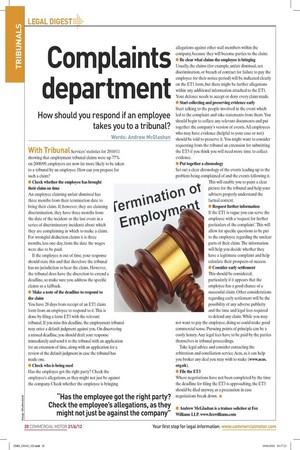Complaints department
Page 14

If you've noticed an error in this article please click here to report it so we can fix it.
How should you respond if an employee takes you to a tribunal?
Words: Andrew McGlashan With Tribunal Services’ statistics for 2010/11 showing that employment tribunal claims were up 77% on 2008/09, employers are now far more likely to be taken to a tribunal by an employee. How can you prepare for such a claim?
• Check whether the employee has brought their claim on time An employee claiming unfair dismissal has three months from their termination date to bring their claim. If, however, they are claiming discrimination, they have three months from the date of the incident or the last event in a series of discriminatory incidents about which they are complaining in which to make a claim. For wrongful deduction claims it is three months, less one day, from the date the wages were due to be paid.
If the employee is out of time, your response should state this and that therefore the tribunal has no jurisdiction to hear the claim. However, the tribunal does have the discretion to extend a deadline, so make sure you address the specific claims as a fallback.
• Make a note of the deadline to respond to the claim You have 28 days from receipt of an ET1 claim form from an employee to respond to it. This is done by filing a form ET3 with the relevant tribunal. If you miss this deadline, the employment tribunal may enter a default judgment against you. On discovering a missed deadline, you should draft your response immediately and send it to the tribunal with an application for an extension of time, along with an application for a review of the default judgment in case the tribunal has made one.
• Check who is being sued Has the employee got the right party? Check the employee’s allegations, as they might not just be against the company. Check whether the employee is bringing allegations against other staff members within the company, because they will become parties to the claim.
• Be clear what claims the employee is bringing Usually, the claims (for example, unfair dismissal, sex discrimination, or breach of contract for failure to pay the employee for their notice period) will be indicated clearly on the ET1 form, but there might be further allegations within any additional information attached to the ET1. Your defence needs to accept or deny every claim made.
• Start collecting and preserving evidence early Start talking to the people involved in the event which led to the complaint and take statements from them. You should begin to collate any relevant documents and put together the company’s version of events. All employees who may have evidence (helpful to your case or not) should be told to preserve it. You might want to consider requesting from the tribunal an extension for submitting the ET3 if you think you will need more time to collect evidence.
• Put together a chronology Set out a clear chronology of the events leading up to the problem being complained of and the events following it. This will enable you to paint a clear picture for the tribunal and help your advisers properly understand the factual context.
• Request further information If the ET1 is vague you can serve the employee with a ‘request for further particulars of the complaint’ . This will allow for specific questions to be put to the employee regarding the unclear parts of their claim. The information will help you decide whether they have a legitimate complaint and help calculate their prospects of success.
• Consider early settlement This should be considered, particularly if it appears that the employee has a good chance of a successful claim. Other considerations regarding early settlement will be the possibility of any adverse publicity and the time and legal fees required to defend any claim. While you may not want to pay the employee, doing so could make good commercial sense. Pursuing points of principle can be a costly luxury. Any legal fees have to be paid by the parties themselves in tribunal proceedings.
Take legal advice and consider contacting the arbitration and conciliation service Acas, as it can help you broker any deal you may wish to make (www.acas. org.uk).
• File the ET3 Where negotiations have not been completed by the time the deadline for filing the ET3 is approaching, the ET3 should be filed anyway, as a precaution in case negotiations break down. n • Andrew McGlashan is a trainee solicitor at Fox Williams LLP. www.foxwilliams.com











































